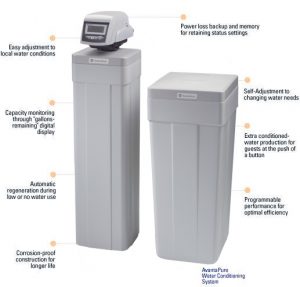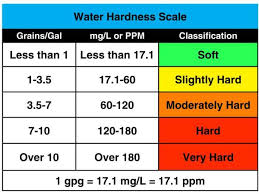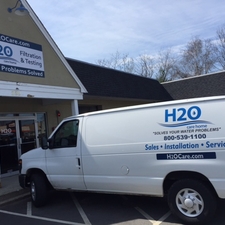WATER SOFTENING
The primary hard water minerals are magnesium and calcium (the hardness minerals), while iron and manganese (“the stainers”) can also be found in South Berwick water, mostly in private wells. These contaminants can be removed with a water softener and/or a properly specified sediment filter depending on whether the contaminant’s form is in solution or particulate. Hard water interferes with many cleaning tasks, from doing the laundry to washing dishes to taking a shower. Washing your hair in hard water may leave it feeling sticky and dull. Dishes and glasses get spotted and a film may build up on shower doors, bathtubs, sinks and faucets. Clothing can look dingy and feel rough and scratchy. Hard water can also cause a residue to build-up in pipes that can lower water pressure.
A water test and analysis will determine the best course of action. A water softener will improve your water greatly if you have hard water minerals, iron, or manganese in your water.Water softeners vary, including up-flow versus down-flow which can make a big difference, particularly if there are elevated levels of iron or manganese in the water. If other impurities are confirmed in the water test, they can be removed with other types of water filtration systems.

HARD WATER SCALE BUILD-UP UNCHECKED
Calcium and magnesium may have major affects on your home’s plumbing and your ability to clean, even though the EPA has no published limits on these. The maximum allowable level (per the Environmental Protection Agency) for iron as a secondary contaminant is .3 parts per million and for manganese is .05 parts per million. Small amounts of these minerals can have very noticeable, even damaging affects on your home’s water quality.
The following chart identifies hard water levels.
OTHER AFFECTS OF IRON, MANGANESE & HARD WATER
Scale from hard water can build-up inside water heaters insulating the temperature sensor inside the tank creating extra work to bring the temperature up to the set level. This reduces the life of your hot water heater and will likely require early replacement. Some other affects of these contaminants include corrosion and scaling inside pipes and major staining throughout the home’s showers, bathtubs, and sinks. For those using their well water for lawn irrigation, iron and manganese can cause major staining of walkways, siding and anyplace the water touches. See the link at https://h2ocare.com/lawn-irrigation/. Hydrogen Sulfide is evidenced typically by a rotten egg smell in water, however this may also be caused by high Manganese levels in the water as well. A water filtration specifically for this problem is effective in correcting this.
WHAT A WATER SOFTENER REMOVES
A water softener effectively removes dissolved forms of iron & manganese and hardness minerals from the water. To remove particulate iron or manganese, water filtration utilizing a cartridge filter with proper micron rating will be effective. Depending on the situation, this could require a series of filters with different size micron ratings to handle heavier levels of different sized particles in the water. Selecting an appropriate micron rating and style of filter can be determined by a water treatment professional based on water test results and other symptoms. For more information on Iron and Manganese in water, see our published articles in Water Technology Magazine at the following link: https://h2ocare.com/publications/.
For more on hard water, see water.usgs.gov/edu/hardness.
ARSENIC & RADON IN PRIVATE WELLS
A water softener will not remove the health threat contaminants Radon and Arsenic which may be found in South Berwick and will require different water filtration technologies. Arsenic in water can be removed at the point of entry into the home with tanks filled with arsenic specific resin that captures the arsenic before it can get into the home’s water supply. Point of use systems for drinking water can use reverse osmosis technology to effectively remove arsenic. Radon can be safely removed with an aeration system that agitates the incoming well water, releasing the gas from the water in a sealed chamber, then safely venting it to the outside ambient air. Speak to a water treatment professional to decide which system is right for you.






